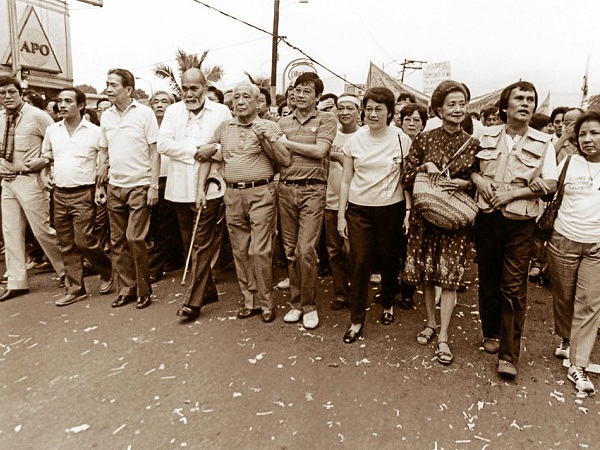No one inherits people power legacy

A PAGE FROM MARTIAL LAW HISTORY. The dictatorship was practically on its last legs when the usual suspects in the Marcos opposition led yet another protest march on Oct. 7, 1984. In a little over a year, People Power on Edsa would stun the world. From right: Etta Rosales, Lily de las Alas-Padilla, Cory Aquino, Wigberto Tañada, Lorenzo Tañada, Ramon Pedrosa, Ambrosio Padilla. They marched from Santo Domingo Church on Quezon Blvd Extension in Quezon City to Welcome Rotonda, on the boundary with Manila, where a reception party of riot cops dispersed them. INQUIRER PHOTO
Update
IN A FEW weeks, Filipinos will celebrate the 30th anniversary of the outbreak of the bloodless Edsa People Power Revolution on Feb. 22-25, 1986, marking the collapse of President Ferdinand Marcos’ dictatorship era of 14 years.
By sheer coincidence, the Philippine Daily Inquirer (PDI), which was founded on Dec. 9, 1985, just over two months before Marcos, his family and entourage, fled to Honolulu for asylum, thanks to his friend, US President Ronald Reagan, ended on Thursday two weeks of mourning the demise on Dec. 24, 2015, of its editor in chief of 24 years, Leticia Jimenez-Magsanoc. For members of the Inquirer staff, her departure marked an untimely changing of the guard.
For her contributions to Philippine journalism, she received tributes from colleagues in the Inquirer and public officials, including President Aquino.
Fr. Tito Caluag, in his homily at the last Mass for her at the PDI office, said the PDI’s tribute to her was not only a recognition of her contributions to Philippine journalism but also a “promise that (the PDI) will not allow (the Marcos martial law era) to be forgotten”—a story Magsanoc “lived for and which she was willing to die for.”
Caluag challenged those whom Magsanoc had mentored and inspired “to do her honor and great service by making sure that the story (of the struggle by Filipinos to end the dictatorship) is not forgotten.”
It is not my purpose to make this recollection to pay fulsome tribute to Magsanoc’s qualities and integrity as a journalist, already amply expressed by my peers.
I can’t claim being close to her, but in our professional relationship in the Inquirer—she as editor and I as an opinion writer and member of the editorial board—I best remember two things in this division of functions in the newspaper: First, she never interfered with my editorial independence vis-à-vis criticism of the sitting government (from the regime of President Estrada up to the time of President Aquino). She as well respected and trusted the independence of the opinion writers.
Sacrosanct dictum
The other creed—a very important one—that I shared with Magsanoc in the course of our discussions of editorial policy on the editorial board, is the principle that it is completely in bad taste and improper for journalists to project themselves in the news report.
News is about objective events—not about our relatives and/or friends. Who cares about them? We write news, events and hard facts, and we write about events which affect general public interests.
The sacrosanct dictum for journalists is: Stay out of the news. We are not newsmakers. We don’t run governments, although there are some of us who like to believe we set the agenda of public debate and political and social change.
After all, if we really examine our intervention in public affairs, we are reminded that our function as a gadfly of society is what some media pundits put it: Torment the rulers and defend the afflicted from their tormentors.
In the process of our self-examination of our journalistic functions to investigate venalities in public office and corrupt public transactions, we are confronted by issues raised by critics of the media, such as who elected journalists to hold elected officials accountable for their performance in public service?
The mandate of the press to pursue inquiries into public office performance flows from the Bill of Rights of the 1987 Constitution that guarantees freedom of speech but at the same time sets out limits against abuse of the these rights.
No heir to legacy
In the lead up to the 30th anniversary of 1986 Edsa People Power Revolution, some issues were raised about who appointed the Inquirer as the custodian and torchbearer of the legacy of Edsa I.
Edsa I was the most historical turning point in the Philippine political regime in the postwar years—a fundamental departure from the two-party system that prevailed before Edsa I.
It not only marked the downfall of the dictatorship but also the Edsa tradition under which the Filipinos exercised directly for the first time their sovereign right to determine the shape of their government and who should be their rulers in their new system.
The media, emancipated from the martial law framework of the dictatorship by masses of people in the streets, figured prominently as the cutting edge of this people power movement. The untrammeled media reported the narrative of this movement.
Thirty years after Edsa I, the media are confronted with questions over whether people power has led Philippine democracy to a stable political system capable of achieving sustained economic growth that reduces poverty, and that closes the abysmal social gap between the rich and the poor.
As the country enters a presidential election in May next year, doubts persist over whether people power is the correct formula for economic growth that leaves no social growth behind.
There is no sign that we have found a new paradigm to replace the people power tradition.
This is not the time to celebrate people power. The lineup of presidential candidates in next year’s election offers little promise for hope. No one inherits the people power legacy.
(This is an update to correct the name of the priest from Tito Calauag to Caluag.)















